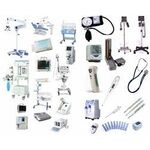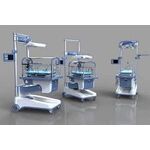Medical Instruments
What is a Medical instrument:
A medical instrument is a tool or device used by healthcare professionals to diagnose, treat, and manage medical conditions. They are designed to be precise, accurate, and durable to provide accurate results and ensure patient safety. Medical instruments come in various sizes, shapes, and designs to meet specific medical needs.
Types of Medical Instruments:
There are numerous types of medical instruments used in healthcare settings. Here are some of the most common types of medical instruments and their uses:
- Diagnostic Instruments: These instruments are used to diagnose medical conditions. Examples of diagnostic instruments include stethoscopes, otoscopes, ophthalmoscopes, blood pressure monitors, and thermometers.
- Surgical Instruments: These instruments are used during surgical procedures to cut, dissect, grasp, or hold tissue. Examples of surgical instruments include scalpels, forceps, scissors, retractors, and clamps.
- Therapeutic Instruments: These instruments are used to provide treatment to patients. Examples of therapeutic instruments include nebulizers, oxygen concentrators, and dialysis machines.
- Monitoring Instruments: These instruments are used to monitor patient vital signs and physiological parameters. Examples of monitoring instruments include ECG machines, pulse oximeters, and respiratory rate monitors.
Medical Instrument Features:
Medical instruments come with various features designed to meet specific medical needs. Here are some of the most common features of medical instruments:
- Accuracy: Medical instruments must be accurate to provide reliable results and ensure patient safety.
- Durability: Medical instruments must be durable to withstand repeated use and regular cleaning.
- Ease of Use: Medical instruments must be easy to use to ensure accurate results and minimize the risk of user error.
- Portability: Some medical instruments are designed to be portable for use in different settings.
Medical Instrument Benefits:
Medical instruments offer numerous benefits to healthcare professionals and patients. Here are some of the most common benefits of medical instruments:
- Accurate Diagnosis: Medical instruments provide accurate diagnosis of medical conditions, enabling healthcare professionals to provide appropriate treatment.
- Improved Treatment: Medical instruments facilitate improved treatment of medical conditions, leading to better patient outcomes.
- Reduced Risk: Medical instruments help reduce the risk of medical errors, ensuring patient safety.
- Time Saving: Medical instruments save time by providing quick and accurate results, enabling healthcare professionals to make timely decisions.
Medical Instrument Uses:
Medical instruments have a wide range of uses in healthcare settings. Here are some of the most common uses of medical instruments:
- Diagnosis: Medical instruments are used to diagnose medical conditions, such as stethoscopes for listening to heart sounds, and ophthalmoscopes for examining the eyes.
- Surgery: Medical instruments are used during surgical procedures to cut, dissect, grasp, or hold tissue.
- Treatment: Medical instruments are used to provide treatment to patients, such as nebulizers for delivering medication to the lungs.
- Monitoring: Medical instruments are used to monitor patient vital signs and physiological parameters, such as ECG machines for monitoring heart activity.
Price of Medical instrument:
| Medical instrument | Price Range |
| BiPAP Machine Price | ₹40,500.00 - ₹150,000.00 |
| CPAP Machine Price | ₹550,100.00 - ₹640,000.00 |
| Oxygen concentrator price | ₹75,000.00 - ₹450,000.00 |
| portable ventilators Price | ₹245,500,00 - ₹723,952,00 |


